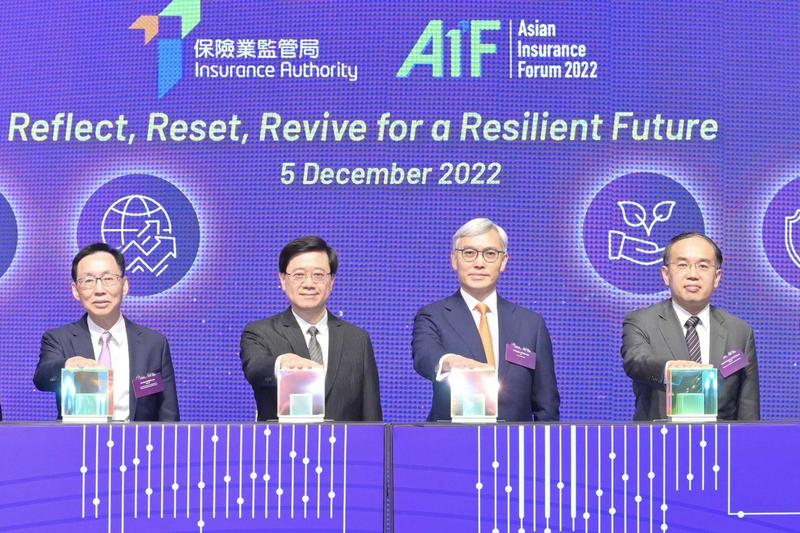December 7, 2022
HONG KONG – Hong Kong will integrate the city’s insurance sector with national development, riding on the country’s “dual circulation” strategy to bolster the special administrative region’s role as an international risk management center.
Chief Executive John Lee Ka-chiu made the pledge on Monday at the Asian Insurance Forum 2022 – a hybrid event hosted by the Insurance Authority. Experts from the industry are taking part in the event to discuss business issues pertinent to global insurance players.
Chief Executive John Lee Ka-chiu made the pledge on Monday at the Asian Insurance Forum 2022 – a hybrid event hosted by the Insurance Authority
On domestic circulation, Lee noted that Hong Kong is already preparing to integrate the Chinese mainland and Hong Kong insurance markets.
“We are making final preparations to set up insurance after-sales service centers in the strategic locations of Nansha and Qianhai, bolstering support for customer enquiries, premium payments, claims settlement and complaints holding for holders of issuance policies issued in Hong Kong,” he said.
The HKSAR government will also forge ahead with the unilateral recognition policy that will help Hong Kong residents to obtain compulsory third-party insurance coverage on the mainland separately; and compile a mortality rate table for the Guangdong-Hong Kong-Macao Greater Bay Area to re-engineer cross-boundary medical and illness products.

Chief Executive John Lee Ka-chiu (second left) and Secretary for Financial Services & the Treasury Christopher Hui Ching-yu (first right) attend the Asian Insurance Forum 2022 on Dec 5, 2022. (PHOTO / HKSAR GOVERNMENT)
On international circulation, the focus will be on lifting Hong Kong’s status as a world risk management center and a sophisticated insurance hub. The risk-based capital regime, to be implemented in 2024, will bring the insurance sector’s regulatory framework on par with those of all leading financial centers. The risk-based capital regime will provide better supervision of insurers operating in the SAR, covering the three pillars of quantitative assessment, corporate governance, and disclosure to align capital requirements with the risk profile and asset-liability matching of insurers.
“This year, we will commence a public consultation exercise on comprehensive proposals for a policyholders’ protection scheme to provide an additional safety net in case of insurer insolvency,” Lee said.
Since last year, the Insurance Authority’s group-wide supervision regime has been fully aligned with international standards. Moreover, the SAR government has introduced a 50-percent reduction in the profits tax rate for general reinsurance businesses and selected general insurance operations of direct insurers, selected insurance brokerage companies, as well as captive insurers.
Coinciding with this year’s Asian Insurance Forum, the SAR government on Monday unveiled the development roadmap document for the local insurance industry.
“As market participants are reassessing and reprioritizing risks in light of the pandemic and geopolitical tensions, it is an opportune time for the government to announce the roadmap, outlining a set of visions and directions for the development of our insurance sector by riding on the ‘dual circulation’ strategy and integrating into the national development arena,” Financial Secretary Paul Chan Mo-po said.
The document emphasized that integration of the insurance business hinges on connecting with the mainland and global markets, attracting new and nurturing existing talents, adopting technologies, and enhancing data accessibility.
“I am confident that, with the concerted efforts of the government, the Insurance Authority and industry stakeholders, we can propel our insurance sector to new heights,” said Secretary for Financial Services and the Treasury Christopher Hui Ching-yu.
Hong Kong is one of the world’s insurance hubs, with more than 160 insurers operating in the city – 12 of them being among the world’s top 20 – and generating over HK$580 billion ($74.35 billion) in gross premiums last year.


